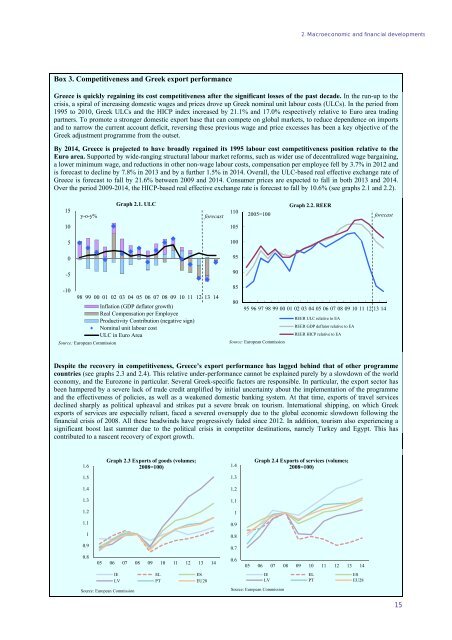ocp192_en
ocp192_en
ocp192_en
Create successful ePaper yourself
Turn your PDF publications into a flip-book with our unique Google optimized e-Paper software.
Chart 3Graph 2.3. Exports of goods (volumes; 2008=100)Chart 4Graph 2.4. Exports of services (volumes; 2008=100)2. Macroeconomic and financial developm<strong>en</strong>tsBox 3. Competitiv<strong>en</strong>ess and Greek export performanceGreece is quickly regaining its cost competitiv<strong>en</strong>ess after the significant losses of the past decade. In the run-up to thecrisis, a spiral of increasing domestic wages and prices drove up Greek nominal unit labour costs (ULCs). In the period from1995 to 2010, Greek ULCs and the HICP index increased by 21.1% and 17.0% respectively relative to Euro area tradingpartners. To promote a stronger domestic export base that can compete on global markets, to reduce dep<strong>en</strong>d<strong>en</strong>ce on importsand to narrow the curr<strong>en</strong>t account deficit, reversing these previous wage and price excesses has be<strong>en</strong> a key objective of theGreek adjustm<strong>en</strong>t programme from the outset.By 2014, Greece is projected to have broadly regained its 1995 labour cost competitiv<strong>en</strong>ess position relative to theEuro area. Supported by wide-ranging structural labour market reforms, such as wider use of dec<strong>en</strong>tralized wage bargaining,a lower minimum wage, and reductions in other non-wage labour costs, comp<strong>en</strong>sation per employee fell by 3.7% in 2012 andis forecast to decline by 7.8% in 2013 and by a further 1.5% in 2014. Overall, the ULC-based real effective exchange rate ofGreece is forecast to fall by 21.6% betwe<strong>en</strong> 2009 and 2014. Consumer prices are expected to fall in both 2013 and 2014.Over the period 2009-2014, the HICP-based real effective exchange rate is forecast to fall by 10.6% (see graphs 2.1 and 2.2).15y-o-y%Graph 2.1. ULCforecast1102005=100Graph 2.2. REERforecast101055100095-590-1098 99 00 01 02 03 04 05 06 07 08 09 10 11 12 13 14Source: European CommissionInflation (GDP deflator growth)Real Comp<strong>en</strong>sation per EmployeeProductivity Contribution (negative sign)Nominal unit labour costULC in Euro Area858095 96 97 98 99 00 01 02 03 04 05 06 07 08 09 10 11 12 13 14REER ULC relative to EAREER GDP deflator relative to EAREER HICP relative to EASource: European CommissionChart 1Graph 2.1. ULCChart 2Graph 2.2. REERDespite the recovery in competitiv<strong>en</strong>ess, Greece’s export performance has lagged behind that of other programmecountries (see graphs 2.3 and 2.4). This relative under-performance cannot be explained purely by a slowdown of the worldeconomy, and the Eurozone in particular. Several Greek-specific factors are responsible. In particular, the export sector hasbe<strong>en</strong> hampered by a severe lack of trade credit amplified by initial uncertainty about the implem<strong>en</strong>tation of the programmeand the effectiv<strong>en</strong>ess of policies, as well as a weak<strong>en</strong>ed domestic banking system. At that time, exports of travel servicesdeclined sharply as political upheaval and strikes put a severe break on tourism. International shipping, on which Greekexports of services are especially reliant, faced a severed oversupply due to the global economic slowdown following thefinancial crisis of 2008. All these headwinds have progressively faded since 2012. In addition, tourism also experi<strong>en</strong>cing asignificant boost last summer due to the political crisis in competitor destinations, namely Turkey and Egypt. This hascontributed to a nasc<strong>en</strong>t recovery of export growth.1.6Graph 2.3 Exports of goods (volumes;2008=100)1.4Graph 2.4 Exports of services (volumes;2008=100)1.51.31.41.21.31.11.211.110.90.805 06 07 08 09 10 11 12 13 14Source: European CommissionIE EL ESLV PT EU280.90.80.70.605 06 07 08 09 10 11 12 13 14Source: European CommissionIE EL ESLV PT EU2815


